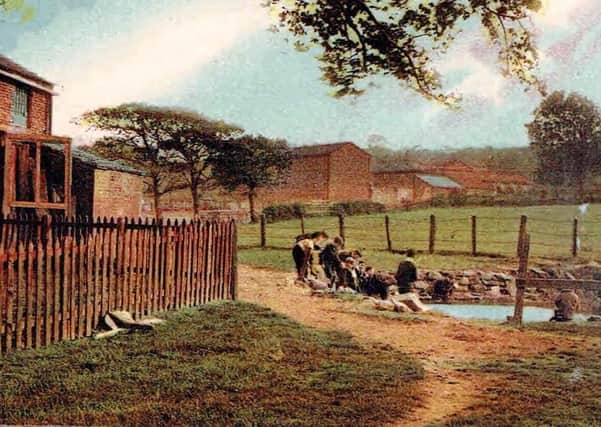The Nostalgia column with Margaret Watson: The countryside was never far away


So, in the meantime let us think back to the days of childhood when at this time of year the countryside would beckon and off we’d go to Bluebell Wood.
In my childhood, most of the population in this district lived in back-to-back houses with no gardens and no view except that of a house facing which was identical to their own.
Advertisement
Hide AdAdvertisement
Hide AdHowever, the countryside was never far away because most of it had not yet been built upon, and there were lots of nearby woodlands and open spaces where people could escape whenever street life got too much.


In the street where I lived there wasn’t a tree in sight and I never awoke to the sound of birds singing, although the occasional pigeon did alight on our window sill now and again
In the autumn we were able to experience real country living when we went potato picking on local farms, which, in those days were operating in almost every village.
Little farmsteads were dotted all around us including at Shaw Cross, Hanging Heaton, Thornhill Lees, Thornhill, Briestfield, Whitley, and neighbouring Mirfield, which at the time, was nearly all countryside.
Advertisement
Hide AdAdvertisement
Hide AdWhere I lived, we didn’t have any babbling brooks or gushing springs, just a mucky beck at the bottom of the street and a mill dam, neither of which looked out of place among the mills and foundries surrounding them.
Yet, we in Springfield never felt deprived because we had a small communal garden at the top of our street called the “Garden of Rest”, so named because that was exactly what it was.
It had no flowers or trees, just two wooden benches and a few privet hedges which sadly never flourished because of the fumes from traffic passing down Halifax Road.
To us, however, it was a special place, a haven where busy housewives could escape to when the pressures of home-life became too great.
Advertisement
Hide AdAdvertisement
Hide AdYet it was near enough to be in earshot in case there were any family emergencies to be dealt with.
There was also Caulms Wood not far from the bottom of our street where we went most weekends to feed the horses there and dip our feet in the little pond from which the animals drank.
All over the wood there were little areas fenced off which were called “pieces” where people living nearby kept livestock, usually hens and chickens, an occasional pig and sometimes a few goats.
Mother, who had been brought up in Horbury told us stories of her childhood there which was spent mainly out of doors in the open countryside,
Advertisement
Hide AdAdvertisement
Hide AdShe talked of local farms and how those living on them didn’t have to rely on anyone for their survival.
They had fresh eggs every day, milk straight from the cow, fruit from the orchard, fresh vegetable daily and home-cured hams all year round, courtesy of the pigs they bred.
To a child like me, born during the war when food was scarce and on ration, it all sounded like a dream and I grew up envying country children.
Although I never actually knew any such children, I was later in my career to meet and interview Christina Gardner who had lived on Crossley Farm in Northorpe, Mirfield.
Advertisement
Hide AdAdvertisement
Hide AdI learned from her that life wasn’t quite so easy for those running small farms and she was happy sometimes to escape to the towns for entertainment.
There had been two houses on their farm and her aunt and uncle had lived in the older one, which didn’t have electricity or piped water, just a pump in the kitchen.
The house she lived in, however, had been built earlier and could boast running water, though only cold, and gas lighting.
Her aunt wouldn’t have a dog but had a formidable security system provided by a small flock of geese which roamed about the yard and up to the kitchen door.
Advertisement
Hide AdAdvertisement
Hide Ad“Any visitor would be signalled by noisy hissings and be surrounded by geese, their long necks outstretched and their wings flapping,” recalled Christina.
“My aunt was the first to get a wireless, which had headphones and we took it in turns to listen to it.
“Life for small farmers in those days was hard physically but they were at least able to live off the farm.
“We didn’t experience the poverty and hunger which many local people did at the time of the Depression.”
Advertisement
Hide AdAdvertisement
Hide AdAlthough born in Mirfield, Christine, who went to school in Ravensthorpe, always regarded herself as a Dewsbury person and would eventually live in both Shaw Cross and Thornhill Lees until the 1970s.
“Throughout my teenage years, up to joining the W.A.A.F, in 1943, Dewsbury was my ‘Big City’ for the weekend entertainment.
“It had five cinemas, one theatre, three dance halls, and a fantastic feast in summer.”
Christina’s uncle, Fred Street, was the manager of the grocery department at Towngate Co-op, Mirfield, and his sister, Miss Hilda Street, was in charge of the drapery department at the same branch.
○ If you have happy memories of the village where you once lived, please share them with us – and with photographs if possible. Mine are running out.
Just email [email protected] with your details.